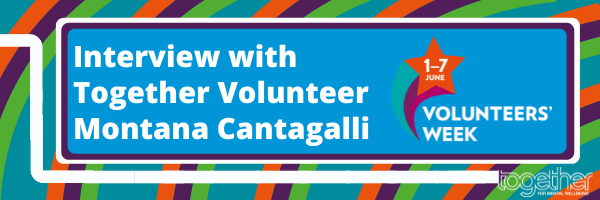Volunteers Week 2022: Interview with Together Volunteer Montana Cantagalli

Volunteers carry out vital work across our Together each day and so for Volunteers Week 2022 we wanted to look in more detail at those roles and how they work alongside people who use our services. Montana Cantagalli has volunteered with us in a few different roles within our criminal justice services and kindly agreed to tell us about those and why lived experience is so important.
We spoke to Montana and started by asking how she came to work with Together:

Could you tell us a bit about yourself and how you came to volunteer with Together?
I joined Together in 2018 as a peer support worker in the criminal justice team! I was a psychology student in my second or third year of university, and had been living with mental illness since I was 14 years old. It was the first volunteer position where lived experience of mental health distress was an asset, and I remember feeling very drawn in by that.
You’ve had a few different volunteering roles with Together, could you maybe tell us a bit about those and ways you’ve used you’re lived experience and knowledge within them?
So, I started at Together in the criminal justice team providing one on one peer support. Shortly after starting that, I was asked if I wanted to volunteer at Thames Magistrates Court 1 or 2 days a week to support the Together team working in the mental health division there. I really enjoyed doing that because I got a chance to work alongside and learn from mental health practitioners in a criminal justice setting and got to support individuals going through a diverse range of vulnerabilities which in itself was rewarding. As a person who has also had experience in the criminal justice system, I found myself being able to strongly empathize with the people I came across and greet them with understanding. Particularly what it is like to go through that system with mental illness/mental distress.
I also got the opportunity to support a service visit, which I also found really enlightening. I got to meet the individuals using Together services and chat to them about their experiences there, and the thoughts and ideas they contribute to shaping their support.
Shortly after, I joined the NSG which I have been a part of now for a little over three years. Being a part of the NSG allowed me to advocate for a principle I have always firmly believed in: that people with lived experience of mental health distress should have a say in how they can best be supported and cared for. I drew on my own experiences of living with mental illness and accessing a variety of services for mental health care. I had also often experienced what it was like to not have a say in my own treatment or care, and being unable to collaborate with practitioners on how to best support me.
As someone who has volunteered with Together in different roles, could you set out what you feel are important factors that need to be present in a volunteering role and ways volunteers need to be supported?
To be a volunteer at Together I think the most basic qualities that should be present are empathy, understanding, and a desire to help others and learn from them and their experiences. I think open-mindedness is also a good one to have, since you will be encountering people with all sorts of different stories and experiences, but that is part of the beauty of it in my opinion.
Volunteers just need to be given a safe space to share their thoughts and ideas, and be checked in with regularly. Working in mental health can be strenuous and it’s important to continuously check in with yourself and not to be afraid to say if you need a break or need extra support during your volunteering time. Make volunteers feel like they are making a difference and encourage them to feel empowered by their ability to support others through their lived experience.
What would you say to someone who was considering volunteering themselves?
I would encourage anyone to volunteer with Together for a few reasons:
- You are taking a vulnerability of your own and using it to empower yourself and others to feel supported and cared for.
- You are able to connect with individuals from all walks of life and potentially shape some wonderful relationships.
- You can help be a vehicle for change in the way mental health is approached by both practitioners and policy-makers alike. You can be the change you want to see in the world.
- You, as a person with lived experience of mental health distress, can utilize your valuable experience to shape new and innovative ways to support others. You can advocate for individuals seeking mental health care to have a say in their own support and be able to provide guidance to practitioners as well, from a lived experience perspective.
Thank you to Montana for taking the time to take part in this interview.


